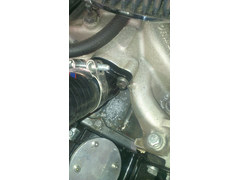

Inlet Stripped Bolt
[Edited on 16/2/15 by Irony]

Put my first helicoil in this evening. I stripped a thread in my rover v8 inlet manifold water system. The head is aluminium. What torque should I do the bolt up to?. Its m8.
I calculated this for my brake calliper brackets, which have a helicoil insert (for extra strength) to bolt them to the upright. Can't remember how I calculated it but for helicoiled aluminium with an M14 thread, it worked out about 70-80% of the torque you would use with a normal steel nut. So maybe that is a good starting point?
Torque to original manufacturers spec.
A helicoil has in theory a higher pull out load than the original thread.
quote:
Originally posted by britishtrident
Torque to original manufacturers spec.
A helicoil has in theory a higher pull out load than the original thread.
Logic would say it's the torque normal applied to steel in aluminium for the outside thread id of the helicoil you are using.see the helicoil tap thread for that. The bolt inside would be steel in steel so would be higher than that of the outside which is steel in aluminium.so to me the lower figure would be correct . So to clarify it's the outside thread of the helicoil which is the limiting factor. So use that.
I have to admit I thought one of the selling points of the helicoil insert was that the fixing could still support the original torque value?
I'd hazard a guess that because the helicoil has a larger surface area in contact with the parent material (effectively going up a bolt size), it
would actually support a higher torque?
That's what I'm saying
With threads cut into light alloys the limiting factor in the torque calculation is the load the will cause failure by the bolt pulling out of the
parent material. As the effective OD of a helicoil is the bolt OD + the pitch of the bolt's thread an M8x1.5 helicoil will pull out from the
parent material at the same load as M9.5x1.5 bolt.
With an inlet manifold it is extremely important that all the bolts are tightened evenly ( many manufacturers have a specified procedure) to ensure a
good seal.
I am a bit surprised you have metric threads on a Rover V8 every one I have worked on had UNC and UNF threads.
As per the previous post you'll be wanting an even contact pressure across the whole mating surface so just tighten it up to the standard
torque.
I was involved in the production of jet engine casings for many years and a lot of the threaded holes were helicoiled from the factory. We had to
collect the broken off tangs and bag them up to be sent to RR with each casing.
Its not a bolt that clamps the manifold to the heads. Its in the water system. It connects the manifold to a steel right angled turn in the water
system. I have tapped the previous UNC/UNF with a M8 helical.


Inlet Stripped Bolt
[Edited on 16/2/15 by Irony]
Torque bolt to manufacturers spec, helicoil is stronger than original female thread if done correctly.
quote:
Originally posted by bi22le
quote:
Originally posted by britishtrident
Torque to original manufacturers spec.
A helicoil has in theory a higher pull out load than the original thread.
This is interesting. Do you have proof? Nor doubting you for a second, you seem to always speak sense, just curious.
Aye, in most of our (space-related) softer alloy components and plastic components we helicoil from the factory to ensure thread strength while maintaining small fastener capability. It also helps for regular disassembly-reassembly joints.